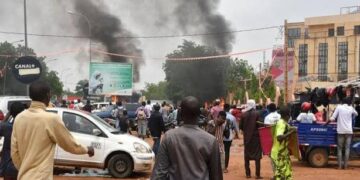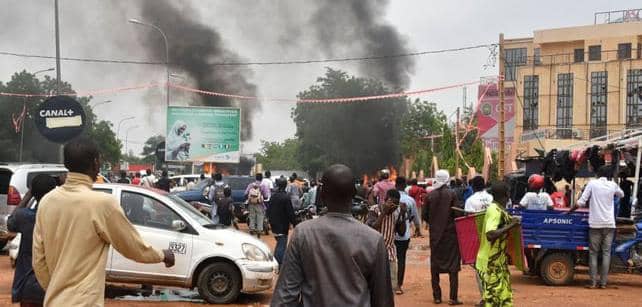By Enyichukwu Enemanna
Barely 24 hours after soldiers of the Presidential Guard in Niger announced a power take-over, which was backed by the army command, supporters of the forceful attempt to unseat President Mohamed Bazoum on Thursday stormed the headquarters of the ruling party in Niamey and set it ablaze after ransacking it.
According to a Reuters reporter, plumes of black smoke were seen from the building, after hundreds of the coup supporters converged in front of the National Assembly and later advanced towards the party’s headquarters.
Police dispersed them with volleys of teargas, as the crowd played pro-army music, the report stated.
Some waved Russian flags and chanted anti-French slogans, echoing a growing wave of resentment towards former colonial power France and its influence in the Sahel region.
“We have always believed in the army’s actions and this time we are with them. For us this is joy,” said Boubacar Hamidou, a human rights activist who was among the crowd outside parliament.
In a statement signed by its chief of staff, the army said it had “decided to adhere to the … declaration” made by soldiers who announced in a late night televised address that they had stripped President Bazoum of power.
It added that its priority was to avoid destabilising the country and it needed to “preserve the physical integrity” of the president and his family and avoid “a deadly confrontation … that could create a bloodbath and affect the security of the population”.
It is not clear who would take over from Bazoum.
The presidential guard, which is drawn from the armed forces and usually protects the president and his entourage, is headed by General Omar Tchiani.
Colonel Amadou Abdramane, who announced the coup on state television flanked by nine other officers, said defence and security forces had acted in response to deteriorating security and bad governance.
Insecurity has remained a problem since Bazoum was elected in 2021, as a jihadist insurgency that took root in Mali in 2012 gained ground, killing thousands and displacing over 6 million across the Sahel.
“We hope the army coming to power will resolve the security crisis. Today terrorism has uprooted so many villages … our children have become widows and our grandchildren orphans,” said Hadjia Aiss, an elderly woman who was among the crowd outside parliament.
Since relations with their military governments soured, prompting foreign troop withdrawals, Niger’s role had become increasingly important for Western powers helping fight a violent insurgency in the region.

































